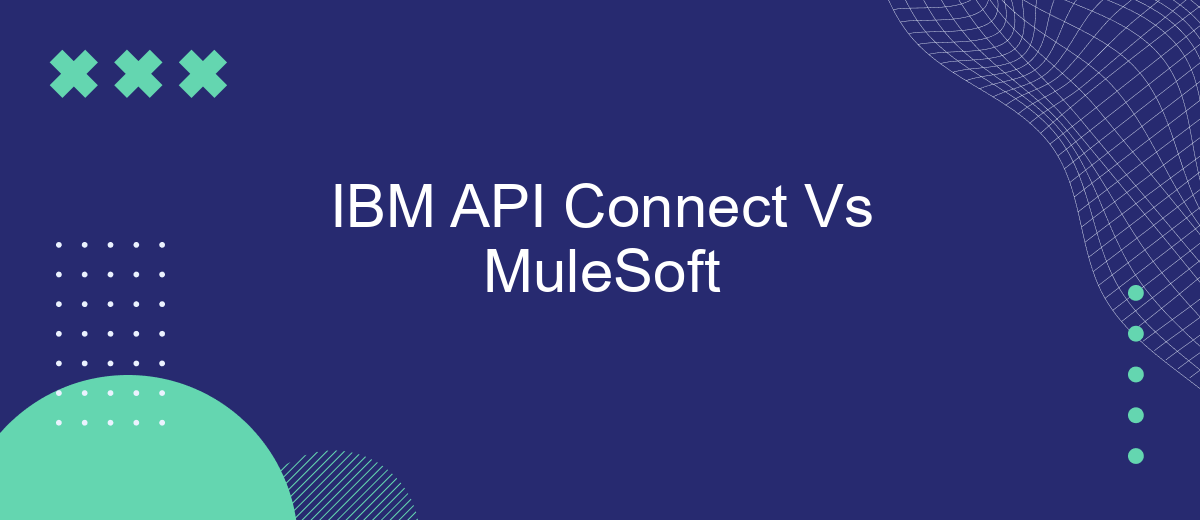In the rapidly evolving landscape of digital transformation, businesses seek robust and scalable solutions for API management. Two leading contenders in this space are IBM API Connect and MuleSoft. This article delves into a comparative analysis of these powerful platforms, examining their features, strengths, and potential limitations to help organizations make an informed decision on which tool best suits their integration needs.
Introduction
In today's rapidly evolving digital landscape, businesses require robust integration platforms to streamline operations and enhance connectivity between various applications. Two prominent players in this domain are IBM API Connect and MuleSoft. These platforms offer comprehensive solutions for API management and integration, empowering organizations to build, deploy, and manage APIs efficiently.
- IBM API Connect: Known for its scalability and security, IBM API Connect provides a unified experience for managing the entire API lifecycle, from creation to retirement.
- MuleSoft: Renowned for its versatility, MuleSoft's Anypoint Platform allows businesses to connect any application, data source, or device, both on-premises and in the cloud.
While both platforms offer powerful features, the choice between IBM API Connect and MuleSoft depends on specific business needs and integration requirements. Services like SaveMyLeads can further simplify the integration process by automating data transfer and synchronization between various systems, ensuring seamless operations. Understanding the strengths and capabilities of each platform is crucial for making an informed decision that aligns with your organizational goals.
Overview of IBM API Connect and MuleSoft

IBM API Connect is a comprehensive, end-to-end API management solution that enables organizations to create, secure, manage, and socialize APIs across cloud environments. It offers robust tools for designing and testing APIs, as well as advanced analytics to monitor performance and usage. With its intuitive interface and extensive security features, IBM API Connect helps businesses streamline their API lifecycle management and ensure seamless integration with various applications and services.
MuleSoft, on the other hand, is a leading integration platform that provides tools for connecting applications, data, and devices. Its flagship product, Anypoint Platform, allows developers to design, build, and manage APIs and integrations in a unified environment. MuleSoft's approach emphasizes reusability and scalability, making it ideal for complex enterprise environments. Additionally, MuleSoft supports a wide range of connectors, enabling seamless integration with numerous third-party services and applications, such as SaveMyLeads, which automates lead data transfer and enhances marketing and sales workflows.
Comparison of Features

When comparing IBM API Connect and MuleSoft, it is essential to consider their features to determine which platform best suits your integration needs. Both platforms offer robust capabilities but differ in their specific functionalities and user experiences.
- API Management: IBM API Connect provides comprehensive API lifecycle management, including creation, testing, and monitoring. MuleSoft, on the other hand, offers API management through its Anypoint Platform, focusing on design, implementation, and governance.
- Integration Capabilities: MuleSoft excels in integration with its extensive library of connectors, allowing seamless connectivity with various systems. IBM API Connect integrates well with IBM Cloud services but may require additional configurations for non-IBM environments.
- User Experience: MuleSoft offers a user-friendly interface with its Anypoint Studio, facilitating easier API design and management. IBM API Connect provides a more enterprise-focused interface, which may have a steeper learning curve for new users.
- Automation and Workflow: Both platforms support automation, but MuleSoft has a slight edge with its flow designer. For businesses looking to automate integrations without extensive coding, services like SaveMyLeads can complement these platforms by providing pre-built workflows and easy-to-use automation tools.
In conclusion, the choice between IBM API Connect and MuleSoft depends on your specific requirements, such as the need for extensive integration capabilities, user experience preferences, and automation needs. Both platforms are powerful, but their strengths align differently with various business scenarios.
Use Cases and Benefits

IBM API Connect and MuleSoft are both powerful tools for managing APIs and integrations, but they cater to different needs and use cases. IBM API Connect is ideal for enterprises that require robust security features and advanced analytics. It is particularly beneficial for industries like finance and healthcare where data protection is paramount.
On the other hand, MuleSoft excels in providing a comprehensive integration platform that supports a wide range of applications and data sources. It is well-suited for businesses looking to streamline their operations by connecting various systems, whether on-premises or in the cloud. MuleSoft's Anypoint Platform offers extensive pre-built connectors, making it easier to integrate with popular services such as SaveMyLeads.
- IBM API Connect: Best for secure, high-performance API management.
- MuleSoft: Ideal for diverse integration needs and extensive connectivity options.
- SaveMyLeads: Great for automating lead management and integrating with CRM systems.
Both IBM API Connect and MuleSoft offer unique benefits that can significantly enhance an organization's integration capabilities. By choosing the right tool based on specific use cases, businesses can achieve greater efficiency, improved data management, and enhanced security.
Conclusion
In conclusion, both IBM API Connect and MuleSoft offer robust solutions for API management and integration, each with its unique strengths. IBM API Connect excels in providing a comprehensive, enterprise-grade platform with strong security features and seamless integration with other IBM products. On the other hand, MuleSoft stands out with its versatile Anypoint Platform, which offers extensive connectivity options and an intuitive user experience, making it a favorite for businesses looking for flexibility and ease of use.
When choosing between the two, organizations should consider their specific needs and existing infrastructure. For businesses seeking a straightforward way to automate integrations without extensive technical knowledge, services like SaveMyLeads can be invaluable. SaveMyLeads simplifies the process of connecting various applications, allowing teams to focus on their core activities. Ultimately, the choice between IBM API Connect and MuleSoft will depend on the organization's priorities, whether they are looking for comprehensive security and enterprise integration or flexibility and ease of use.


FAQ
What are the primary differences between IBM API Connect and MuleSoft?
Which platform is better for large-scale enterprise integrations?
Can both IBM API Connect and MuleSoft be used for cloud-based integrations?
How do these platforms handle security?
Is there an easy way to automate integrations without extensive coding?
Use the SaveMyLeads service to improve the speed and quality of your Facebook lead processing. You do not need to regularly check the advertising account and download the CSV file. Get leads quickly and in a convenient format. Using the SML online connector, you can set up automatic transfer of leads from Facebook to various services: CRM systems, instant messengers, task managers, email services, etc. Automate the data transfer process, save time and improve customer service.
